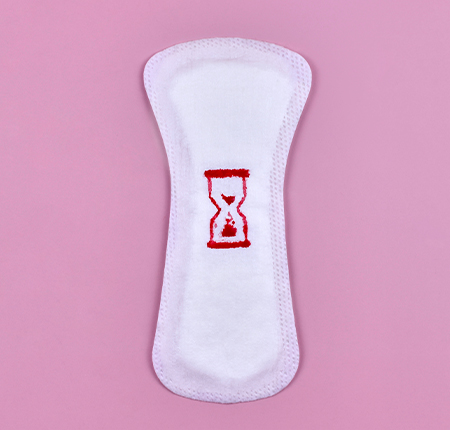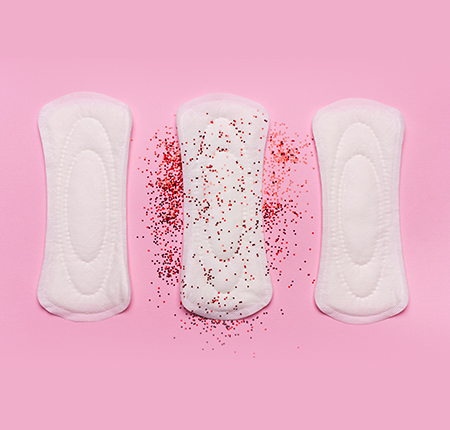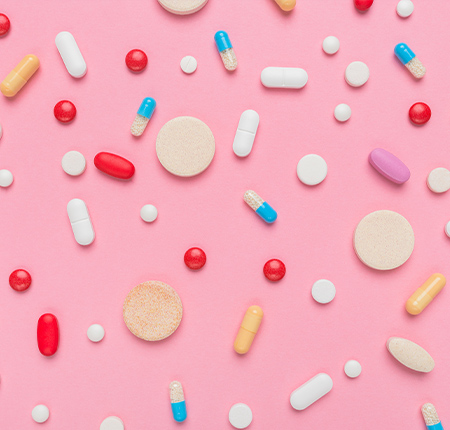
Over time, our bodies go through a wide variety of changes. In adolescence we think about puberty and the hormonal changes it brings. As adults, pregnancy is one of the major changes that can affect the body. And once we reach the age of 40, we can't help but think that we are approaching menopause.
What is menopause?
But what exactly is menopause? Menopause is a deeply personal experience that most women and female-bodied trans/non-binary people go through. From a medical point of view, menopause is the time when ovarian functions cease. As a result of this, female sex hormones are no longer secreted, and ovulatory functions cease. In short, it can be said that menopause sets in one year after the last menstrual cycle.

At what age does menopause occur?
Menopause usually occurs between the ages of 45 and 50. Menopause established before the age of 45 is called early menopause.
What is early (premature) menopause

Premenopause/perimenopause symptoms (starting with menopause)
Perimenopause also known as premenopause is a period of transition to the onset of menopause. It usually starts after the age of 45 and can last for several years.
8 out of 10 women feel at least one symptom of menopause during this period, if not more. Among them we can list:
Hot flushes
Bad mood
Breast pain
Fatigue
Irritability
Sleep disorders
Difficulty concentrating
Migraines or headaches
Anxiety
Depression
Vaginal discomfort
Decreased interest in sex
Urinary incontinence or repeated urinary tract infections (UTIs).
Joint and muscle pain
bloating
Memory disorders
During this period, menstruation becomes irregular, and the flow may vary. ENROUSH pads are easy to use, made to absorb flow evenly across the entire surface and contain only 100% organic cotton, no other ingredients. Thanks to the ingredients used, they are gentle on the skin and have a beneficial effect in the case of vaginal discomfort.
Menopause symptoms
Once established, menopause can manifest itself differently from one woman to another. While some people only deal with mild symptoms, for others they are persistent and unpleasant. A good understanding of the situation and how menopause can affect you can help you manage the changes your body is going through more easily.
Menopause can set in suddenly, with the disappearance of periods, or progressively with rare, irregular periods that appear once every 2-3 months. Menopause itself occurs when menses stop permanently.
Menopause symptoms can be grouped into several categories:
Changes in hair, skin and nails: dry, dull hair, brittle nails that break easily, dry skin that needs extra hydration
Changes in the mucous membranes: vaginal dryness, recurrent urinary infections , urinary loss on exertion, sneezing or laughing, decreased muscle tone in the pelvic area.
The possibility of weight gain, because adipose tissue is distributed differently
Puffy eyes, bags under the eyes, dark circles
Joint pain, with tingling or numbness
Effectiveness mood changes, depression, anxiety, sleep disturbances, panic attacks. During this period, the onset of severe psychiatric pathologies is possible.
Hot flushes
Poor general condition: fatigue, lack of appetite, headache, abdominal cramps, dizziness and even loss of consciousness.
Postmenopausal symptoms
Postmenopause can extend over a period of 2-6 years. At its end all ovarian functions will have ceased completely.

Emotional states at menopause
Menopause causes many hormonal changes, and some of them have mental consequences. These problems can appear even during premenopause. We mean mood disorders, anxiety, depression and sleep disorders here. In the case of people who have suffered from depression or anxiety before, the risk of occurrence is even greater.
From the point of view of treatment possibilities, it must be individualized from one person to another. Treatment options include:
cognitive behavioral therapy
antidepressant and anxiolytic drugs
individualized treatment for certain symptoms
therapies to improve sleep
Vaginal atrophy at menopause
Many women will experience vaginal changes following menopause. Estrogen and androgen levels decrease. As a result the skin becomes thinner and less elastic. This can lead to a phenomenon called vaginal atrophy. These changes lead to dryness, discomfort and painful intercourse. Moreover, in many cases vaginal atrophy is one of the elements that lead to urinary infections and the weakness of the pelvic floor.
Menopause Test & Diagnosis
To determine if menopause has set in, as a first step a panel of blood and urine analyzes is used: blood count, lipid profile, blood sugar, transaminases, kidney function, including urine summary. In certain cases, the specialist doctor will also be able to ask for analyzes of the level of hormones (estrogens, progesterone) and gonadotropes (FSH, LH, prolactin).
If estrogen levels are low and FSH and LV are between 70-100, this is a sign that ovarian function has stopped.
The specialist doctor may also request additional tests to confirm the diagnosis of menopause:
thyroid hormone analysis
bilateral breast ultrasound
transvaginal utero-ovarian ultrasound
thyroid ultrasound
When should you go to the doctor?
After the onset of menopause, it can have a negative effect on physical health. As a result, a series of medical investigations are indicated
Cardiology: as estrogen levels decrease, the risk of developing cardiovascular disease increases. As a result, it is important to see your cardiologist for routine investigations, blood tests - especially cholesterol, LDL, HDL and triglycerides - and blood pressure monitoring
Rheumatology: osteoporosis is one of the main diseases that sets in with menopause. In the first years of postmenopause, bone density decreases, bones become more fragile and the possibility of fractures appears. The rheumatologist will do tests to find out the bone density and offer specialized drug treatment.
Urology: urinary incontinence can occur at menopause. The vagina, urethra and smooth muscle of the bladder lose elasticity; as a result, there will be a need to urinate frequently or there will be leakage of urine in the case of sneezing. These problems can also lead to urinary tract infections. The specialist doctor can recommend specific treatment for urinary incontinence to prevent these manifestations.
Recommended treatments for menopause

Hormonal therapy
Hormone therapy refers to the administration of intravaginal estrogen. Depending on the needs of each person, the specialist doctor may recommend the administration of vaginal creams, tablets or eggs containing estrogens (estriol). Topical hormone therapy can help with vaginal dryness, reduce pain during intercourse, and reduce urine loss. However, this type of treatment is not recommended for everyone. Before starting it you must talk to a specialist doctor.
Estrogen replacement
Hormone therapy, also known as hormone replacement therapy (HRT), aims to replace estrogen in the body when it declines during menopause. Usually, the treatment regimen contains estrogen and progesterone. Its purpose is to lessen the effects of symptoms caused by menopause. However, HRT is not recommended for everyone. People who have already had treatments for certain types of cancer or are prone to developing them should talk to a specialist doctor to find out what treatment options are recommended for them.
Drug treatment without hormones
Depending on the particularities of each case, the specialist doctor may also recommend hormone-free menopause drugs. This treatment can be aimed at the cardiovascular, osteoarticular or neuropsychic system. There are also a number of herbal supplements that can relieve menopausal symptoms.
Treatment for vaginal atrophy
To relieve the symptoms of vaginal atrophy you can use vaginal lubricants as a first form of treatment. In addition to these, there are a number of hormonal treatments:
Estrogen applied locally at vaginal level in the form of cream, gel, tablets, pessary or vaginal ring
Vaginal DHEA, which is administered as a pessary
HRT treatment
Changes in lifestyle
Menopause is characterized by a drop in estrogen levels, a change that can lead to a number of chronic long-term complications. Decreased estrogen can have a negative impact on the bone and cardiovascular system. This fact leads to the occurrence of cardiovascular diseases and osteoporosis. However, a proper diet and a healthy lifestyle can reduce the symptoms of menopause in the long term and protect you from the risk of developing the chronic diseases mentioned above.
For bone health we mention two basic substances that keep bones strong: calcium and vitamin D. As a result, it is recommended to have a diet rich in dairy products, green vegetables such as spinach or kale, cereals, white beans, fish to accumulate the recommended dose of calcium from food. Vitamin D can be found in eggs, grains, red meat and dairy products, and can be supplemented with vitamin D supplements available in pharmacies.
To protect the heart and prevent the occurrence of cardiovascular diseases, there are a number of preventive measures that you can use:
Avoid saturated fats and use only unsaturated fats
Add fish to your diet twice a week
Avoid excess salt
Do not drink alcohol in excess. Avoid smoking completely
Add fiber-rich foods like whole grains, fruits, and vegetables to your diet
During menopause it is also beneficial to have an active life. Exercise relieves menopausal symptoms such as hot flashes, anxiety and depression. Moreover, they prevent the accumulation of extra pounds and reduce the risk of heart disease.
Because menopause can lead to panic attacks, major depressive episodes, sleep disturbances, and anxiety disorders, psychological therapy can also have important beneficial effects on improving quality of life and reducing unpleasant symptoms.
The return of the menstrual cycle at menopause
During perimenopause, hormonal instability can lead to irregular periods, spotting and even heavy bleeding.
With the onset of menopause, the menstrual cycle does not return. Bleeding during menopause is not normal. They can have a benign reason - for example, they can be caused by an unexpected fall or insufficiently lubricated intercourse - or they can be a sign of a serious medical condition.
First of all, don't get impatient. Protect yourself with daily absorbent pads made only from 100% organic cotton.
After this step, it is good to consider going to the doctor. As I said above, the cause can be a harmless one. However, it is also possible that this metrorrhagia is caused by a type of cancer. You can find out more information in our article about metrorrhagia and its manifestation.
And men enter menopause?
Menopause in men is still a topic discussed among specialists. Male menopause is an informal term used to talk about the decline in testosterone levels in men. This hormonal disorder can lead to symptoms similar to those experienced by women during perimenopause and menopause.
Frequently asked questions
Can you get pregnant when you are in menopause?
Pregnancy at menopause is possible in two cases. In the first case, it is the one in which the ovarian function has not completely ceased, which can lead to the appearance of a pregnancy. That's why it's important to use protection until menopause finally sets in. Another possibility, for women who want to conceive at menopause, is through in vitro fertilization with donated oocytes.
What vitamins are taken during menopause?
The B vitamin complex helps maintain the health of the nervous system and metabolic balance. They also have a beneficial effect on hair, nails and skin that can be affected by menopause. Vitamin D and Calcium taken together have a strengthening effect on bones. Vitamin D also helps strengthen the immune system. Magnesium helps the heart and muscles to function at optimal parameters. Zinc also should not be forgotten for the immune system.
How long do menopause hot flashes last?
Hot flashes can last from a few months to 8-10 years.
Why do the ovaries hurt during menopause?
Ovarian pain may occur in premenopause, but at menopause it should disappear. If it persists, a specialist medical consultation is needed.
Why do breasts hurt during menopause?
During menopause, breasts hurt because hormonal changes cause fluid to build up in the breasts, and they become tender and painful to the touch.























